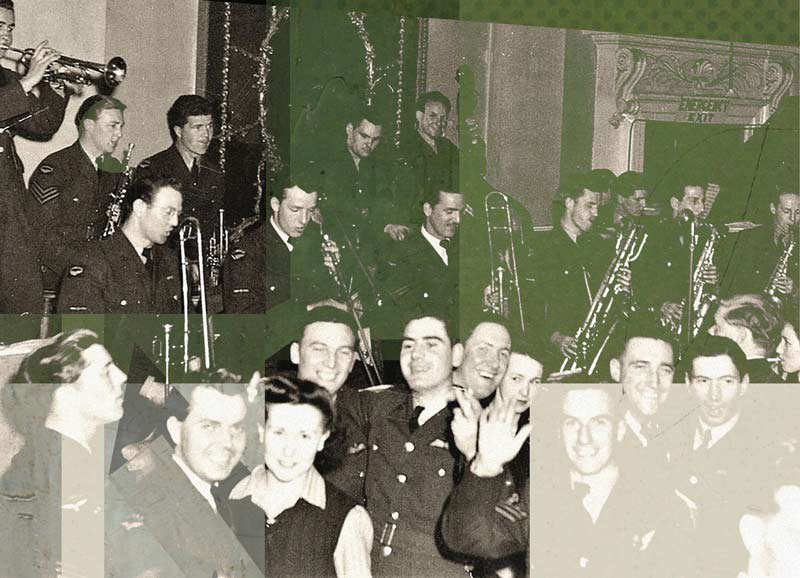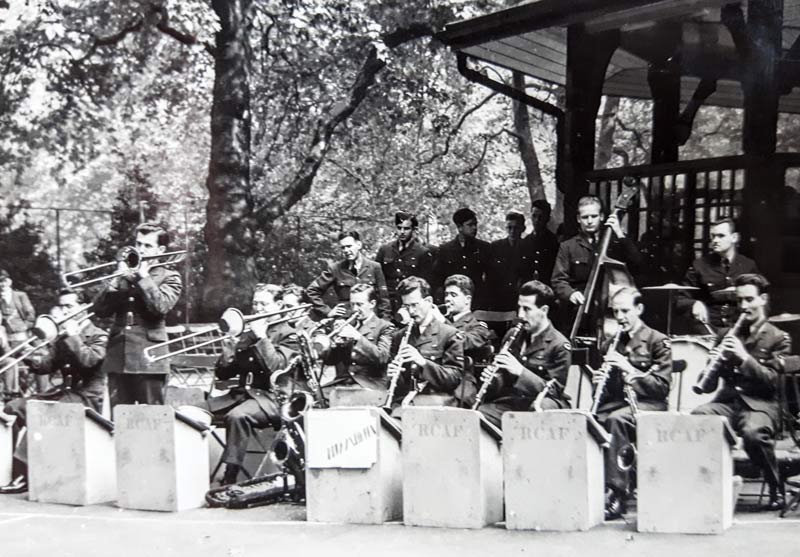
Eighty years ago, on Dec. 22, 1944, the young musicians of the RCAF Streamliners dance/jazz orchestra came under German fire as they rode in a truck to a gig just 230 metres from the front lines during the Battle of the Bulge. My dad Phil Sparling was one of them. He was 22 at the time.
“We played for troops who were heavily armed and each time the doors opened, everyone would look around and point their rifles at the door—just in case they were Germans,” recalled drummer Don Hilton.
Guitarist Len Coppold said: “you could practically feel the Germans’ breath.”
About a week later, early on New Year’s Day, they dodged death again during a German air attack that destroyed 50 planes on the ground and a barracks they were to have stayed at near Nijmegen, Netherlands.

Ten months later, they picked up human bones and saw emaciated survivors at the Bergen-Belsen concentration camp, where Allied forces were struggling to deal with the aftermath of the Nazi Holocaust.
Mortar fire, bullets, air attacks and concentration camps weren’t what Dad and his buddies thought they had signed up for.
I asked Dad several times about his Streamliner memories. He barely mentioned any of those experiences. Then, he died. Wanting to know more, I dug into what knowledgeable others consider one of Canada’s greatest bands.
The Streamliners began in 1941 at the RCAF’s No. 1 Technical Training School in St. Thomas, Ont. Three enlistees from Clinton and Goderich, Ont.—Dad, Jack Perdue and Bill Carter—were learning how to maintain aircraft. They started “jamming” in their spare time. One thing led to another, and three years later, they were part of a band so good, the legendary Glenn Miller himself declared it “the best jazz band in Europe—next to mine!”

The RCAF Streamliners

Pat Riccio: reeds, music director, arranger, Toronto
Bill Carter: trumpet, conductor, Goderich, Ont.
Jack (Jake) Perdue: reeds, Clinton, Ont.
Phil Sparling: reeds, Clinton, Ont.
Frank Palen: reeds, Woodstock, Ont.
Bob Burns: reeds, Toronto
Claude Lambert: trumpet, Wyoming, Ont.
Fraser Lobban: trumpet, Owen Sound, Ont.
Charlie Overall: trombone, copyist, Ottawa
M.O. (Mel) Smith: trombone, Lang, Sask.
Bill Bebbington: trombone, St. Thomas, Ont.
Jack Fallon: bass, London, Ont.
Don Hilton: drums, Toronto
Lyle Kohler: piano, Ottawa
Len Coppold: guitar, Montreal
George Lane: vocalist, Windsor, Ont.
Swing was king in 1941 and the big-band craze in the U.S. led by Miller, Benny Goodman and Tommy Dorsey was spreading to Canada. The conditions were ripe for the St. Thomas-based trio to attract other musicians, some with professional experience, to their fledgling group.
Miller himself volunteered for the U.S. army and put together an overseas band that would delight big-band-crazy American military personnel. The Streamliners gradually morphed into a similar kind of unit.
In 1943, the Streamliners were posted to Gander, Nfld., where constant rehearsing and performing under the direction of leader/arranger Pat Riccio turned them into a rock-solid, tight-as-a-drum swing ensemble. After hearing the band, RCAF leadership decided it would be deployed overseas to provide fighting Canadian men and women world-class entertainment—their ultimate taste of home.
They arrived in Liverpool, England, in August 1944. It was a busy and bewildering time, as described in written memories Dad left me:
“Assignments to billets, many shows, dances, recordings and concerts, with the attendant unloading, jolting in trucks to various venues, and everywhere evidence of men and machines pouring into that incredibly small country inhabited by incredibly big-hearted people. Seven-hour train rides (standing mostly) to bases in Cornwall and Devonshire and Wales; ferry from Stanraer across the Irish Sea to Belfast and various Irish camps mostly starting with “Bally;” many visits to Bomber Command bases in Yorkshire, including some American ones where we gluttonized on peaches and eggs and steak.”
During the next 17 months, the band played more than 400 dances and concerts throughout the U.K. and Europe. There were about 20 BBC studio broadcasts for Allied troops around the world and shows with major stars of the day such as vocalists Vera Lynn, Anna Neagle, Gloria Brent and jazz violinist Stéphane Grappelli.

The Streamliners finished second to the Major Glenn Miller Army Air Force Band—the military version of his popular civilian band—in a BBC popularity poll among Allied service personnel, which earned them a double-billing one night with the American superstar’s band in London.
Miller and a few of his musicians watched the Streamliners performance at the Queensberry All-Services Club in the city. According to both drummer Hilton and guitarist Coppold, they saluted the Canadians on stage. A few days later, Dec. 15, 1944, Miller went missing on a flight over the English Channel. Neither his body nor the plane were ever found, and the circumstances of his death are still unknown.
Other features of life in London in 1944 were the Luftwaffe bombings of the “Baby Blitz” early in the year and nightly V-1 and V-2 rocket attacks later in the year. Combined, the strikes claimed nearly 5,000 lives, and the Canadian musicians had several close calls.
Trumpeter Claude Lambert escaped with his life one night. Heading out for a pub, he came to an intersection, and unsure of which way to go, turned left. He didn’t find the pub, but soon afterward a V-2 crashed into the street on the right, destroying the whole block.
“Really scary,” said Coppold of the raids. “When the V-1s got close, and that motor went off, you didn’t know whether they were going to explode on top of you or down the street a bit, and there would always be a big explosion. So, you might get three or four of those coming every night, and then you’d get a V-2…I mean, they came in so high you couldn’t see them, you had no idea. It wasn’t a soft and easy time for us, nor for the Brits, who, I’m tellin’ you, were so strong and optimistic coming out of those subways in the morning and going back to work.”
The legendary Glenn Miller himself declared it “the best band in Europe—next to mine!”
On Dec. 18, 1944, the Streamliners flew across the Channel to Eindhoven, Netherlands, to begin a month-long tour close to the front lines. Canadian troops were a big part of the Allied effort to drive the Nazis back east to Berlin, and the band’s mission was to provide them with momentary escape when possible.
Four days later, they were under fire at Grave Bridge near Nijmegen. A week later, very early on Jan. 1, 1945, the Nazis came calling again with an air attack.
“All of a sudden, we heard thundering and bullets and aircraft zooming in and out going after the aircraft on the tarmacs,” related Coppold in 2020 of the New Year’s Day seige. “They destroyed about 50 planes that never got off the ground. We were all okay. We’d stuck together, glad we were still alive. But the Germans killed a lot of ground crew that day.”
After the war, during a second tour of France, Belgium and Germany, the entire band witnessed the horror’s aftermath from the Bergen-Belsen concentration camp. Some 50,000 prisoners, most of them Jews, had died at the facility as a result of disease, brutality and hunger. During the Streamliners’ visit, many of the 60,000 Bergen-Belsen detainees alive at the time of the site’s liberation were at a nearby facility for displaced persons, as British and Canadian forces tried to care for them as the first step in a plan for their resettlement.
“What you saw…people [the survivors]…they were everywhere,” said Coppold. “Lying down, or on their knees, with dirty clothes, the stench…couldn’t compare with anything. I never saw one child among the survivors, but we saw a lot of kids’ clothing, some of it stuck in the fences. I’ll never forget it.”

After the war, during a second tour of France, Belgium and Germany, the entire band witnessed the horror’s aftermath at the Bergen-Belsen concentration camp.
A couple of months later, the Streamliners’ overseas deployment ended. A couple of them—bassist Jack Fallon and saxophonist Bob Burns—stayed in Europe and carved out impressive careers in British jazz circles, playing with mega-stars such as Duke Ellington and Sarah Vaughan. Both Fallon and Burns can be heard on Beatles’ recordings; Fallon plays a fiddle solo in “Don’t Pass Me By,” and Burns is the lead clarinetist on “When I’m Sixty-Four.”
Leader/arranger Riccio and drummer Hilton were prominent postwar musicians in Toronto. But most, like my dad, came home, found other employment and only played in bands on the side for the rest of their lives.
As he boarded the Île de France for the homeward crossing in January 1946, Dad savoured the band’s five-year meteoric success. But not for long. “It was time to sweep it all under a mat, and get on with the rest of our lives,” he wrote in his memoir to me before he died. “The twanging of all those guitars soon swept the big bands away.”
To the end of his life, Dad neither described nor expressed any emotion about the tough moments I now know he experienced. The closest he came were these words about the band’s popularity among the troops in the recollections he penned:
“Some heroes. Always felt sheepish when guys who fought and killed and lived in terror in planes and trenches started applauding us.”
I asked him once if he would ever like to go back to England.
“No thanks,” he said. “The last time I was there, somebody tried to kill me.”
Advertisement










